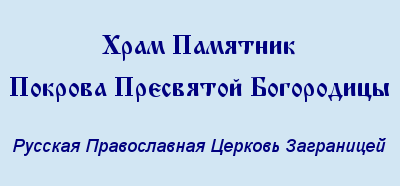Dear in Christ Brothers and Sisters,
Congratulations with the feasts of the Resurrection of the Lord and of the Holy Fathers (this Sunday we once again remember all the Old Testament saints), as well as with the final Sunday of the Nativity Fast!
Today, as is the case every year on the Sunday before Christmas, we heard in the Gospel reading a long list of the ancestors of our Lord Jesus Christ, as well as the story of the birth of our Saviour from the Most-Pure Virgin Mary. If you listened attentively to the Gospel or if you read today’s excerpt at home beforehand, perhaps you would have noticed some strange or hard-to-understand moments. Today let’s discuss one of these places.
The Holy Evangelist Matthew with much attention and exactness writes that Jesus Christ was born from the Virgin Mary, and that although she was betrothed to Joseph, the Child that she was carrying was conceived of the Holy Spirit. The teachings about the Virgin’s birthing of our Saviour, as well as the ever-virginity of the Most-Holy Theotokos (the teaching that Mary was a virgin before the nativity of Christ, during His birth, as well as after) are of utmost importance for the Christian faith. Despite this, today’s Gospel reading ended with the following words: “[Joseph] knew her not till she had brought forth her firstborn son: and he called his name Jesus.” According to this verse, one could come to the conclusion that truly the Theotokos was a virgin when she gave birth to the Saviour, but that afterwards she and Joseph had a normal life, they had a regular and happy family in which other ordinary children were born.
This type of understanding of this verse, while it may at first glance seem rational, is in fact incorrect. The words ‘till’ or ‘until’ or similar expressions in Holy Scripture sometimes have a meaning that is not what first comes to mind. It may seem to us that these words mean that the Most-Holy Virgin Mary and Joseph did not form a regular family before Jesus Christ was born, but that afterwards they had a normal family life. But if we compare other places from Holy Scripture with similar phrases, we will see that ‘till’ means not only that which was before a particular moment, but also that which was after. You can find these places in the Bible yourselves and compare them. Some examples can be found here: Genesis 8:7 (‘until’ is used in the KJV), Psalm 71 (72):7 (‘so long as’ in the KJV), Psalm 109 (110) 1 (‘until’ in the KJV), as well as other places.
The word that the Theotokos gave birth to her ‘firsborn’ could also cause confusion for some. One could think that if she gave birth to a firstborn it means that there must have been other children later, that is, others apart from the firstborn, or at least one other child. We hear the word ‘firstborn’ and immediately think that he is the first in a series of others. Although we may think this, it is not necessary so, because the Jewish law had certain special conditions that had to be fulfilled in regards to the firstborn; whether or not this firstborn later had siblings had no bearing on these conditions. We can read about this in the Old Testament (Exodus 13:12-15; 22:29; 34:20; Numbers 3:45; 8:17; 18:16). Therefore the term ‘firstborn’ means simply the first boy born to a woman, irrespective of how many other children do or do not follow.
Finally, let’s note that it would be quite strange for Joseph, a holy and pious man, to form a normal family with Mary after the miraculous nativity of Jesus Christ. How could one form a family with a woman who conceived of the Holy Spirit and gave birth to our incarnate Lord Jesus Christ?
Today, in this pre-Christmas season, let’s pray to the Most-Holy Virgin Theotokos that we spend the final days of Advent calmly and in a spiritually fruitful manner, so that in a week’s time we can worthily meet the newly-born Saviour.
priest Alexis







